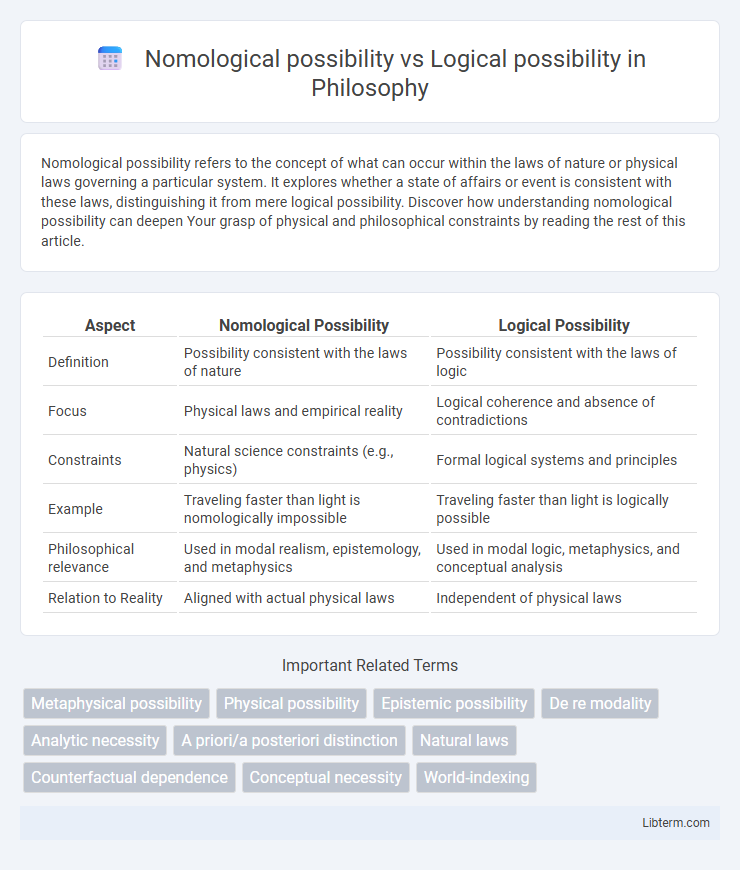Nomological possibility refers to the concept of what can occur within the laws of nature or physical laws governing a particular system. It explores whether a state of affairs or event is consistent with these laws, distinguishing it from mere logical possibility. Discover how understanding nomological possibility can deepen Your grasp of physical and philosophical constraints by reading the rest of this article.
Table of Comparison
| Aspect | Nomological Possibility | Logical Possibility |
|---|---|---|
| Definition | Possibility consistent with the laws of nature | Possibility consistent with the laws of logic |
| Focus | Physical laws and empirical reality | Logical coherence and absence of contradictions |
| Constraints | Natural science constraints (e.g., physics) | Formal logical systems and principles |
| Example | Traveling faster than light is nomologically impossible | Traveling faster than light is logically possible |
| Philosophical relevance | Used in modal realism, epistemology, and metaphysics | Used in modal logic, metaphysics, and conceptual analysis |
| Relation to Reality | Aligned with actual physical laws | Independent of physical laws |
Introduction to Possibility Modalities
Nomological possibility refers to scenarios consistent with the laws of nature, meaning events could occur without violating physical laws. Logical possibility encompasses all scenarios that do not entail contradictions, regardless of natural laws or empirical constraints. Understanding these distinctions is crucial for analyzing modal statements in metaphysics and philosophy of science.
Defining Logical Possibility
Logical possibility refers to the coherence of a proposition within the bounds of formal logic, where a statement is considered logically possible if it does not entail a contradiction. Unlike nomological possibility, which depends on the laws of nature and what is physically feasible, logical possibility is unconstrained by empirical facts and focuses solely on the consistency of concepts and propositions. For example, a square circle is logically impossible because it violates the law of non-contradiction, whereas traveling faster than light may be logically possible but nomologically impossible given current physical laws.
Understanding Nomological Possibility
Nomological possibility refers to scenarios that are consistent with the laws of nature as we understand them, distinguishing it from logical possibility, which only requires the absence of contradiction. Understanding nomological possibility involves recognizing that while a state of affairs might be logically conceivable, it may still be impossible if it violates physical laws, such as the conservation of energy. This concept is crucial in fields like philosophy of science and modal logic, where it frames discussions about what could occur within the bounds of natural laws.
Key Differences Between Logical and Nomological Possibility
Logical possibility refers to scenarios consistent with the laws of logic, allowing for any situation that does not entail a contradiction, whereas nomological possibility is constrained by the actual laws of nature as understood through physics and empirical science. A logically possible world might include phenomena violating physical laws, but a nomologically possible world conforms strictly to empirical natural laws. Key differences lie in logic's abstract rules versus nomology's dependence on empirical data and the physical universe.
Examples of Logical Possibility
Logical possibility refers to scenarios or statements that are consistent with the laws of logic and do not entail any contradictions. Examples include the existence of a unicorn, which is logically possible because it does not violate any logical laws despite lacking empirical evidence, or the concept of time travel, which is logically coherent within certain logical frameworks. Logical possibility contrasts with nomological possibility, which is constrained by the actual laws of nature, such as the impossibility of faster-than-light travel under current physical laws.
Examples of Nomological Possibility
Nomological possibility refers to scenarios consistent with the laws of nature, such as water boiling at 100degC under standard atmospheric pressure or an object in free fall accelerating due to gravity. In contrast, logical possibility encompasses any scenario that does not involve a contradiction in terms, regardless of natural laws, such as unicorns existing or humans flying unaided. Examples of nomological possibility highlight events or states achievable within our universe's physical laws, emphasizing constraints like conservation of energy or thermodynamics.
The Role of Physical Laws in Nomological Constraints
Nomological possibility is defined by what is allowed within the constraints of physical laws, such as gravity and thermodynamics, shaping what can occur in the actual world. Logical possibility, however, encompasses any scenario that does not involve a contradiction, regardless of physical feasibility. Physical laws play a crucial role in nomological constraints by limiting possibilities to those consistent with empirical science, thus excluding logically possible but physically impossible outcomes.
Logical Possibility in Philosophy and Thought Experiments
Logical possibility in philosophy refers to scenarios or propositions that do not entail a contradiction within the framework of formal logic, allowing them to be conceived without violating logical laws. Thought experiments often leverage logical possibility to explore hypothetical cases that challenge understanding or reveal implications without relying on actual physical or empirical constraints. The distinction between logical and nomological possibility emphasizes that while logical possibility concerns coherence in thought, nomological possibility is constrained by the laws of nature.
Intersections and Overlaps: When Logical Meets Nomological
Nomological possibility refers to what is consistent with the laws of nature, while logical possibility concerns what does not violate the principles of non-contradiction or formal logic. The intersection of logical and nomological possibilities occurs when a scenario is both logically coherent and physically feasible within the constraints of natural laws. This overlap is crucial in scientific theorizing, where hypotheses must be logically valid and conform to empirical laws to be considered viable.
Implications for Metaphysics and Science
Nomological possibility pertains to what is physically possible within the laws of nature, impacting scientific inquiry by guiding hypotheses constrained by empirical realities. Logical possibility encompasses all scenarios consistent with non-contradiction, offering metaphysics a broader scope to explore concepts beyond empirical constraints. Distinguishing these modalities is crucial in metaphysics and science for understanding the limits of explanation and the nature of laws governing reality.
Nomological possibility Infographic

 libterm.com
libterm.com